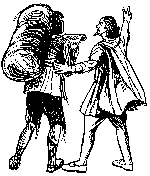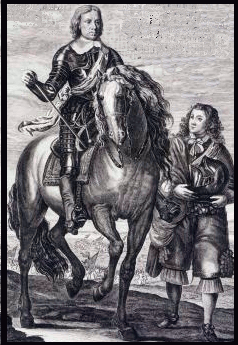
This Page Title – Men of the Awakening – Daniel Rowlands
The Wicket Gate Magazine "A Continuing Witness".
Internet Edition number 78 – placed on line May 2009
Magazine web address – www.wicketgate.co.uk

In these days of high-powered evangelistic efforts and revival techniques which are calculated to reach the sinner and bring them to Christ, it may come as a bit of a surprise to us to learn that when the great evangelical awakening of the 18th century spread to the Principality of Wales, it did so in the wake of a ministry that consisted in little more than the singing of a psalm, the preaching of a sermon, and the offering of a prayer.
Such a ministry was Daniel Rowlands' who, for almost fifty years expounded the Word of God – week in, week out – in the little village of Llangeitho in Cardinganshire, at the same time ranging out into the countryside round about with the words of eternal life through Christ his Lord. "When he made his appearance in the pulpit," an eye-witness informs us, "he frequently gave out … Psalm 27 verse 4 to be sung. Only one verse was sung before sermon … then Rowlands would stand up and read his text distinctly in the hearing of all … Rowlands would go on with his discourse in a calm deliberate manner … at length his voice became so elevated and authoritative, that it resounded throughout the whole chapel … There was very little, if any, inference or application at the end of Rowland's sermon, for he had been applying and enforcing the glorious truths of the gospel throughout the whole of his discourse. He would conclude with a few striking and forcible remarks … then he would make a very sweet, short prayer, and utter the benediction."
Certainly not the kind of "model" service that we would find in our modern-day evangelistic text books; and yet, it was following the offering of one of those "very sweet, short prayers" that the Holy Spirit of God visited the little church at Llangeitho and rushed in mighty winds throughout the whole of Wales. "By Thine agony and bloody sweat," prayed Daniel Rowlands one morning, "by Thy cross and passion, by Thy precious death and burial, by Thy glorious resurrection and ascension, and by the coming of the Holy Ghost, good Lord deliver us." As the prayer was being offered, both minister and congregation alike were overcome by the presence of the Lord, and soon, the whole of the surrounding countryside was to know these outpourings, as well.
Now, what kind of a man was this "instrument of blessing" in a day when spiritual barreness had almost entirely enveloped the whole land? Born in 1713, he was ordained to the ministry at the early age of twenty and inducted as Curate to his elder brother who was then Rector of Llangeitho. Like the great majority of the ministers of his day Daniel Rowlands began his ministry with absolutely no idea of the evangelical gospel, or of the standards and demands of a work of God in a person's heart.
After morning service on the Lord's Day he would enter with great gusto into the games and sports that had been organised, often finishing the day in a state of drunkenness. Not long after his ordination, however, he went to hear a minister of evangelical persuasion by the name of Griffith Jones. So irreverent and demonstrative was Daniel Rowlands' behaviour that the latter stopped short in his sermon and offered up a prayer especially on Rowlands' behalf that God would touch his heart and make him a faithful minister of the Gospel. This prayer went home to the young Curate's heart, and from that time onward a complete change came over his life and work until, about the year 1742, we see him as one of the most outstanding preachers of the evangelical awakening. The Countess of Huntingdon, that great and noble "Woman of the Awakening," placed him second only to Whitefield himself, while Bishop Ryle, in his Five Christian Leaders, states that "no British preacher of the eighteenth century kept together in one district such enormous congregations of souls for fifty years." "On sacrament Sundays," we are told, "it was no uncommon thing for him to have 1500, or 2,000, communicants! The people on these occasions would go together in companies, like the Jews going up to the Temple feast at Jerusalem, and would return home afterwards singing hymns and psalms on their journey …"
From all over the neighbouring counties the people would come to hear Daniel Rowlands, and out into the neighbouring counties Daniel Rowlands would go in order to be heard. But, as we have said, it was more as a pastor than a pure evangelist that Rowlands did his work, and for those fifty years he preached the word of the Lord to the same people … first of all in the village Church of England building, and then, from the year 1763 until his death in an independently built chapel that was erected for him by some of his old congregation.
This change of circumstance was brought about in a way that had many parallels in those days of revival. Daniel Rowlands, you remember, was simply the "curate" of Llangeitho – his elder brother John being Rector. On the death of his brother (who appears to have left all the preaching and the work of the parish to Daniel) it was supposed that Daniel should then take over as Rector of the church. The Bishop of St. David's however, a man completely opposed to and out of sympathy with the evangelical party, withheld this, and with a calculated "swipe in the mouth" for the older man, appointed Daniel Rowlands' own young son as the new Rector of Llangeitho. In characteristic fashion, however, the old man submitted himself to the decision of the Bishop and the office of his young son. But in characteristic fashion also, the Bishop– having now got a taste for the old pastor's blood – refused to rest until he had seen him finally ejected from the village pulpit. Even good Bishop Ryle, a Church of England stalwart, admits that "A more unhappy, ill-timed, blundering exercise of episcopal power than this, it is literally impossible to conceive." But very often the Lord gives "episcopally-minded" brethren the scope to blunder in order that His grace and power might be made manifest. And in the non-conformist chapel that was now established in Llangeitho for Daniel Rowlands and some of his old congregation he continued with his weekly ministry for the next twenty-seven years, launching out into the towns and villages round about and witnessing the power of the Lord in awakening men and women to their need of redemption.
How many will eventually rise up and call him blessed, under the Lord, only eternity itself will reveal. Over one hundred ministers alone seem to have traced their conversion to his preaching and teaching; from these, under his guidance sprang the Calvinistic Methodists of Wales, and that land "revived and blossomed as the rose."
"I am almost leaving you, and am on the point of being taken away," he told his congregation two weeks before his death at the ripe old age of seventy-seven. "I die as a poor sinner," he told his children, "depending fully and entirely on the merits of a crucified Saviour …" "Alas! Alas! Alas!" he had earlier told an artist who had been set by the Countess of Huntingdon to take his picture, "Alas! Alas! Alas!" taking the picture of a poor old sinner! Alas! Alas!"

This Page Title – Men of the Awakening – Daniel Rowlands The Wicket Gate Magazine "A Continuing Witness". Internet Edition number 78 – placed on line May 2009 Magazine web address – www.wicketgate.co.uk |